Three Women Arrested For Assault On Hijab Enforcer In Tehran Subway
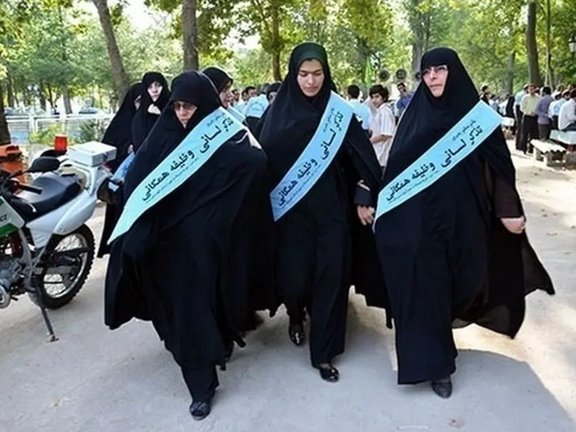
Three women have been arrested for allegedly physically assaulting a hijab enforcer in an incident in the Tehran Metro.

Three women have been arrested for allegedly physically assaulting a hijab enforcer in an incident in the Tehran Metro.
According to Abbas Karami-Rad, the head of the Tehran Metro Police, the incident occurred on Saturday afternoon when one woman approached three others to admonish them regarding their hijabs.
He stated that the situation escalated, leading to the three women "attacking her and physically assaulting her." Subsequently, the three women were taken into custody.
Karami-Rad explained that metro staff, who observed the altercation through surveillance cameras, promptly reported the incident to the law enforcement officer at the station, leading to the arrest of three women.
The incident has stirred negative reactions on social media, particularly in the wake of the tragic death of Armita Geravand, a 16-year-old student, who lost her life due to a violent confrontation with a hijab enforcer in the metro, and authorities deleted all traces of evidence from CCTV footage.
Amir Kalhor, a journalist, took to social media to question the circumstances of the arrests, remarking, "How did they find out? Through the cameras that have operators sitting behind them. After the Armita Geravand incident, there was no news of cameras and operators, and in some cases, the existence of cameras in the metro was denied."
Geravand was the latest victim of the repressive policies of the Islamic Republic, falling into a coma after an altercation with hijab enforcers.
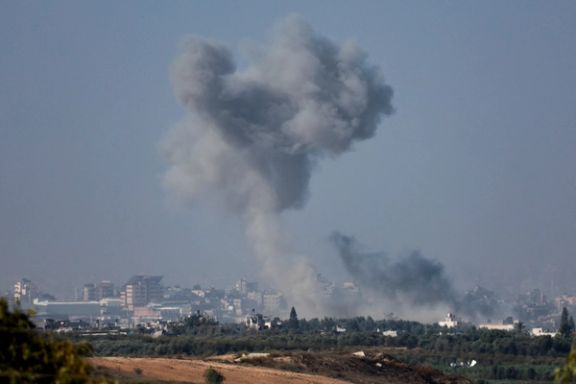
Prime Minister Benjamin Netanyahu said Israel would consider "tactical little pauses" in Gaza fighting, but again rejected a ceasefire despite international pressure.
Netanyahu said a general ceasefire would hamper his country's war effort, but pausing fighting for humanitarian reasons, an idea supported by Israel's top ally the United States, would continue to be considered based on circumstances.
"As far as tactical little pauses - an hour here, an hour there - we've had them before. I suppose we'll check the circumstances in order to enable goods, humanitarian goods to come in, or our hostages, individual hostages, to leave," Netanyahu told ABC News on Monday.
Iran’s foreign minister Hossein Amir-Abdollahian in a social media post on his personal account said that the United States has been suggesting humanitarian pauses in the fighting but accused Washington of duplicity. Tehran has been focusing its rhetoric against the United States in recent days, but so far has chosen not to get directly involved in the conflict.
However, Iran’s proxy forces in Iraq and Syria continue to target US military bases, with injuries among servicemen increasing. So far, the Biden administration has responded in kind only once, despite repeated warnings to Tehran and its militant allies.
Having encircled densely populated Gaza City in the north of the enclave, where the Hamas Islamist group is based, Israel's military said it had taken a militant compound and was set to attack fighters hiding in a warren of underground tunnels.
Israel has bombarded the enclave since the Hamas raid on southern Israel one month ago, when its fighters killed 1,400 people and seized 240 hostages.
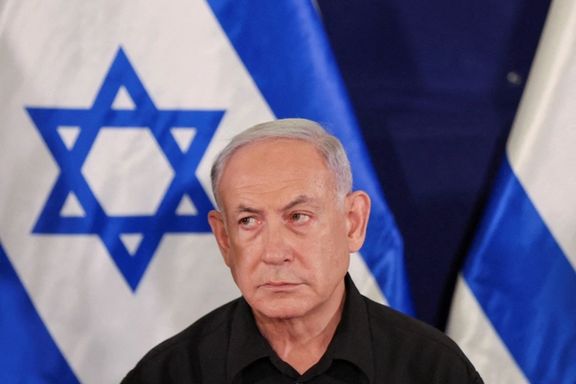
Gaza health officials say the Israeli assault has killed more than 10,000 Palestinians, including some 4,100 children, but these figures cannot be independently verified.
Both Israel and Hamas have rebuffed mounting calls for a halt in fighting. Israel says hostages should be released first. Hamas says it will not free them nor stop fighting while Gaza is under attack.
"But I don't think there's going to be a general ceasefire."
US President Joe Biden discussed such pauses and possible hostage releases in a phone call with Netanyahu on Monday, reiterating his support for Israel while emphasizing that it must protect civilians, the White House said.
Like Israel, the US fears Hamas would take advantage of a full ceasefire to regroup.
International organizations have said hospitals cannot cope with the wounded and food and clean water are running out with aid deliveries nowhere near enough.
"We need an immediate humanitarian ceasefire. It's been 30 days. Enough is enough. This must stop now," said a statement from the heads of several United Nations' bodies on Monday.
The Israeli military said on Tuesday it took control of a Hamas military stronghold in the northern Gaza Strip, where it said the forces located anti-tank missiles and launchers, weapons and various intelligence materials.
Israeli aircraft struck several Hamas militants who had barricaded themselves in a building near the al-Quds Hospital and planned to launch an attack on Israeli forces, it said.
The Israeli military on Monday released video of tanks moving through bombed-out streets and groups of troops moving on foot. It says it has surrounded Gaza City, cutting off northern parts of the narrow coastal strip from the south.
In a press briefing, chief military spokesperson Rear Admiral Daniel Hagari said troops were hunting Hamas field level commanders to weaken the militants' ability "to carry out counter attacks."
The UN Security Council met behind closed doors on Monday. The 15-member body is still trying to agree a resolution after failing four times in two weeks to act. Diplomats said a key obstacle is whether to call for a ceasefire, cessation of hostilities or humanitarian pauses to allow aid access in Gaza.
At a meeting of foreign ministers from the G7 leading democracies in Tokyo, Japan's Foreign Minister Yoko Kamikawa said the group plans to call for a pause in fighting and allowing humanitarian access to Gaza.
With reporting by Reuters
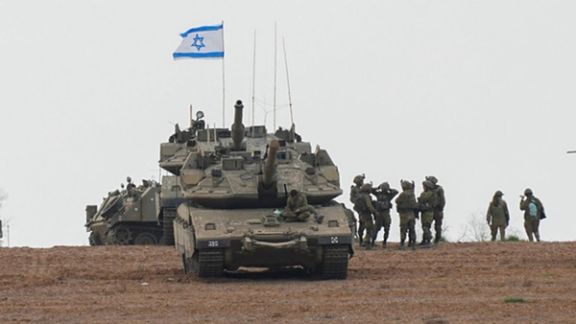
The Pentagon says at least 46 American troops have been injured in Iraq and Syria in attacks by Iranian-backed militia during the past one month.
This number is significantly higher than the last official figure (around 20), announced a fortnight ago.
Since the Hamas terror attack on Israel and the ensuing conflict a month ago, the US government has repeatedly warned Iran and its proxies against attacking American forces in the region. The figures released Monday seem to show, however, that the attackers remain unfazed.
If anything, the war seems to have widened in the last week or two.
Shiite militias in Iraq and Syria, armed groups backed, and often guided by the Islamic Republic are targeting US troops stationed in those countries almost daily.
On Monday, one of the Iraqi armed groups used the Iranian-designed Fateh-110 ballistic missile for the first time against a US base. Hezbollah is believed to have this missile too.
A month has passed since Hamas forces attacked border regions of Israel, killing at least 1,400, mostly civilians, and taking at least 200 hostage. In response, Israel has been bombarding Hamas targets in Gaza and has sent in its army into the enclave to find and destroy Hamas fighters. Hamas officials in Gaza say ten thousand have been killed, but there is no independently verified figure on casualties. At least 1.5 million people have also been displaced, according to the United Nations.
UN Secretary-General Antonio Guterres on Monday repeated his call for an “immediate humanitarian cease-fire” and a halt to the “spiral of escalation” across the region.
Speaking to reporters on the sidelines of a Security Council meeting, Guterres said international humanitarian law is clearly being violated in Gaza. “No party to an armed conflict” is above international law, he said, also demanding the unconditional release of hostages taken by Hamas on 7 October.
Israel insists it is conducting military operation based on the internationally recognized principle of self defense and is doing its utmost to only hit military targets.
The UN Security Council once more failed to agree on a resolution in its Monday meeting, with the US insisting on a ‘pause’ instead of a ‘ceasefire.’
The Biden administration has so far supported Israel unconditionally while the latter tries to “erase” Hamas from Gaza and retake control of the strip. Still, many in Washington blame the administration for having allowed the current crisis, even if inadvertently.
“For nearly 3 years they’ve flooded Iran with close to $100B,” Senator Ted Cruz posted on X. “Iran has used that money to fund terrorist groups such as Hamas and Hezbollah.”
“The Biden Administration's approach was to put Iran first,” former Secretary of State Mike Pompeo said in an interview with Fox News. “We negotiated with the Iranians on the nuclear deal; we stopped enforcing sanctions; we paid a ransom of $6 billion to get back half a dozen hostages – now the Iranians hold even more.”
Pompeo seems to be referring to hostages in Gaza, whose fate is widely believed to be in the hands of the regime in Iran, which holds considerable sway over Hamas.
The Islamic Republic is evidently reluctant to engage in direct war with Israel or the US, despite non-stop rhetoric.
“This is their entire strategy,” Jonathan Schanzer of Foundation for Defense of Democracies said on CNN referring to the regime in Iran. “They are fighting Israel to the last Palestinian, to the last Lebanese, to the last Syrian and to the last Iraqi. They use proxy groups to their advantage so that they can sit safely back in Tehran and watch with delight. "
Reports emerged Monday that the Biden administration has sent strong messages to Iran and Hezbollah via Turkey that the US will intervene immediately if they attack Israel.
Nonetheless, Iranian officials are maintaining their belligerent and threatening tone.
"What has the US done to the region that its Secretary of State, Blinken, arrived in Baghdad with a bulletproof vest,” asked Iran’s Foreign Ministry spokesman Monday.
Secretary of State Antony Blinken, on a tour of the Middle last, visited Iraq briefly, perhaps to try and push the Iraqi government to rein in armed militias who target American bases in the country.
The ones with meaningful influence over Iraqi militias, however, sit not in Baghdad but in Tehran, who seem to remain unperturbed.
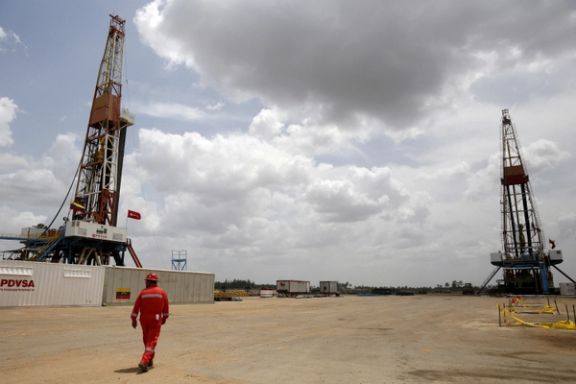
Iran's semi-official Fars news agency has stated that Tehran envisions to boost its oil exports to Venezuela, with a target of 860,000 barrels per day within three years.
This plan involves not only exporting oil but also repairing Venezuelan refineries to facilitate this export. The goal is to restore Iran's oil exports to pre-sanctions levels, reaching 2.5 million barrels per day, amid US sanctions.
This is noteworthy given previous efforts by Iranian companies to repair Venezuelan refineries in 2020, particularly the 'Cardon' refinery, which experienced a fire shortly after repairs, and the unsuccessful overhaul of the El Palito refinery.
Iran renewed a €100 million contract for the repair of the El Palito refinery with Venezuela last year, and the facility, operating at 20% capacity, began operations in June 2023. Previously, this refinery had a daily capacity of 140,000 barrels, and it is unclear what its current capacity is.
Iranian customs statistics suggest that the equipment needed for this refinery has not been exported from Iran to Venezuela. It is likely that the Islamic Republic has purchased second-hand equipment from other countries to repair this refinery.
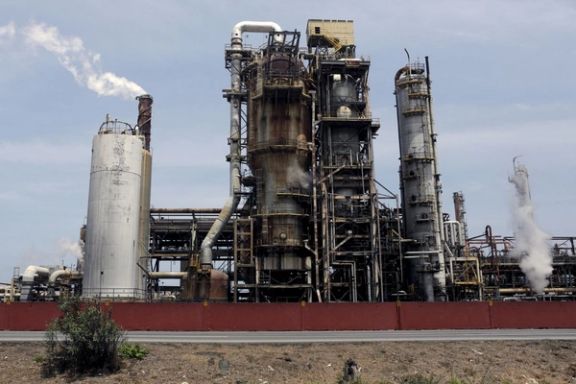
In recent years, Iran's non-oil exports to Venezuela have remained around $20 million annually, equivalent to less than 0.1% of Iran's total non-oil exports.
Amid serious economic isolation, the Iranian regime clings to any small and insignificant international economic deal to show audiences at home that the government is successful in fighting sanctions and instill hope that the economic crisis can be overcome. Minor deals with developing countries in Asia and Africa are trumpeted as major successes.
Iran also signed a gas condensate barter deal with Venezuelan heavy oil, starting in the fall of 2021. Data from the Commodity Intelligence Company, Kepler, indicates that Iran delivered 28 million barrels of gas condensate to Venezuela until January 2023 and bought extra-heavy crude oil from the country for resale to China.
However, since February this year, with the reduction of US oil sanctions against Venezuela, the country has not received any shipments of gas condensate from Iran. This indicates that as soon as Caracas was offered a reprieve from sanctions, it began procurement from other sources.
Iran's ambition to repair Venezuelan refineries and export crude oil to the country is significant considering its own domestic refinery challenges. Iranian refineries have experienced a 10% decline in the past decade due to insufficient maintenance and upgrades, leading to the conversion of 30% of received crude oil into mazut and bitumen, compared to just 4% in modern refineries.
For instance, Iran's largest crude oil refinery, Abadan, converts 47% of the crude oil it receives into mazut and bitumen. The operation of this refinery is, in principle, not economically viable.
Iran had agreements with South Korean and Chinese companies in the mid-2010s aimed at reducing mazut and bitumen production from refineries to 10%. However, these deals were canceled following the US withdrawal in 2018 from the Obama-era JCPOA nuclear deal, and Iran has faced challenges in modernizing and repairing its domestic power plants.
Iran’s oil exports fell from 2.2 million barrels per day in 2017, to less than 300,000 in 2019, after full US sanctions came into force. However, recently Tehran has succeeded to boost exports close to 1.8 million barrels per day, as the Biden administration has failed to enforce the sanctions. China is the main customer of Iran’s illicitly shipped crude.
Venezuela, once possessing a refining capacity of 1.3 million barrels, has seen its capacity diminish to less than 190,000 barrels per day due to refinery aging and inactivity, exacerbated by US sanctions over the past decade.
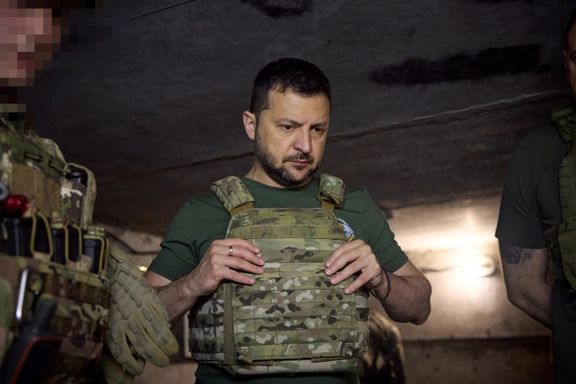
Ukrainian President Vladimir Zelensky has accused the Islamic Republic, Russia and North Korea of being involved in the deadly Hamas attacks on Israel.
He said in an exclusive interview with NBC’s Meet the Press that the three countries are “throwing matches into” the long burning fire between Israel and Palestine by supporting Hamas, which sent thousands of troops to invade Israel on October 7 after a barrage of thousands of rockets, in the deadliest single day for Jews since the Holocaust. It has since led to an horrific bombardment of Gaza in which more than 10,000 people have died.
“I’m sure that Russia was behind and sponsoring Hamas. And Iran, too. That’s who is to blame. When we talk about laws, rules, where there are terrorists, there are no rules,” Zelensky added. Just last week, a Hamas delegation was hosted in Moscow and recent evidence showed North Korean weapons have been used in Hamas attacks on Israel.
The authorities of the Islamic Republic have repeatedly denied any role in planning and executing the military operations of Hamas against Israel though it remains one of its biggest backers, financially and militarily.
Ali Khamenei, the Supreme Leader of the Islamic Republic, stated on October 10 that those who believe the attacks by Hamas are conducted by non-Palestinians have made a “miscalculation.”
Zelensky urged the international community to do everything possible to stop the war in the Middle East. While expressing his readiness to travel to Israel, he stated that the trip depends on the developments on the battlefield in Ukraine and the possibility of returning Ukrainians who are detained in Israel.
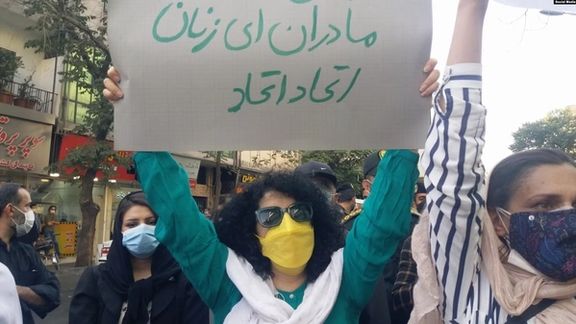
The Nobel Committee has called on Tehran to give medical help to this year's Nobel Peace Prize laureate Narges Mohammadi, on hunger strike in Tehran’s Evin prison.
The imprisoned activist has been on hunger strike since Monday in Evin Prison to protest the lack of medical attention for sick inmates and the jail withholding medical treatment from her because she refused to wear a mandatory head scarf for a hospital visit.
"The requirement that female inmates must wear a hijab in order to be hospitalized, is inhumane and morally unacceptable," the Norwegian Committee said on Monday.
According to a statement released on her Instagram page by Mohammadi's family, she is protesting against what they describe as "the Islamic Republic's policy of procrastination and lack of medical care for the health and lives of prisoners" and "the policy of either death or compulsory hijab for Iranian women."
The women's rights advocate won the award on October 6 in a rebuke to Tehran's theocratic leaders, who accused the Nobel committee of meddling and politicizing the issue of human rights.
The US-based Human Rights Activists News Agency (HRANA) said authorities had not let the 51-year-old go to hospital for heart and lung treatment last week because she had refused to wear a mandatory head scarf for the visit. "This deprivation continues under the order of the prison authorities," HRANA added.
Mohammadi's family, expressing their concerns about her health and physical condition, stated in their announcement that she has needed urgent transfer to a heart and lung center for a week, but after Narges's follow-ups from prison and her lawyer's requests to judicial authorities, the prosecutor has opposed her transfer and refuses to issue the transfer permit.
On October 30, Mohammadi was denied access to proper medical care and a transfer to a hospital for the second time due to her refusal to wear a hijab. Following that, on October 30 and 31, she and some of her fellow inmates staged a sit-in protest in the courtyard of Evin Prison.
"She is willing to risk her life by not wearing the 'forced hijab' even for medical treatment," said a November 1 statement, written before Monday's announcement of the Nobel laureate's hunger strike.
Mahsa Amini, a young woman who was physically assaulted for not wearing compulsory hijab and was killed in a police station in September 2022, and the tragic death of Armita Geravand, a schoolgirl who was subjected to violence by hijab enforcers in the metro and died after 28 days in intensive care, are among the most well-known victims of the compulsory hijab policy of the Islamic Republic.
In recent years, many political prisoners, including Sasan Niknafs, a civil activist, Behnam Mahjoubi, a Gonabadi Dervish religious minority, Baktash Abtin, a poet and filmmaker, and Javad Rouhi, a protester sentenced to death, have lost their lives in prison. The Islamic Republic has not accepted any responsibility for their deaths, which were due to pressure, torture, and the denial of medical care.
In recent years, there have been numerous reports of the lack of medical care for political prisoners and the violation of their right to access proper healthcare by prison authorities in Iran.
According to the Nobel Committee, Mohammadi was recognized for her fight against injustice towards Iranian women and her efforts to promote human rights and freedom for all.
"We are concerned about Narges Mohammadi's physical condition and health," the Free Narges Mohammadi campaign wrote on X, formerly known as Twitter.